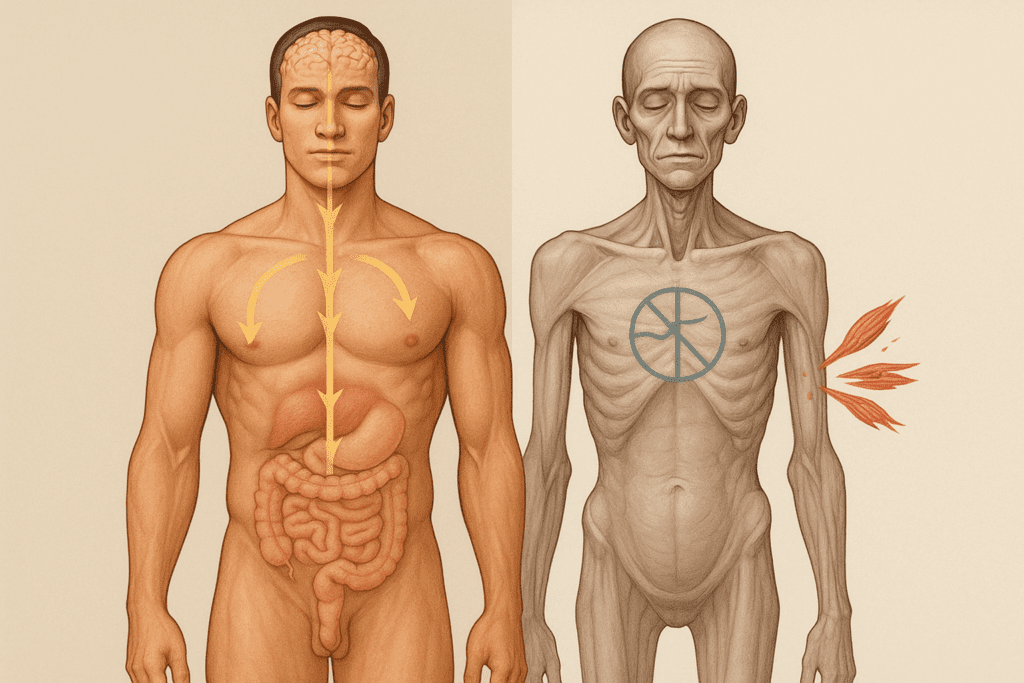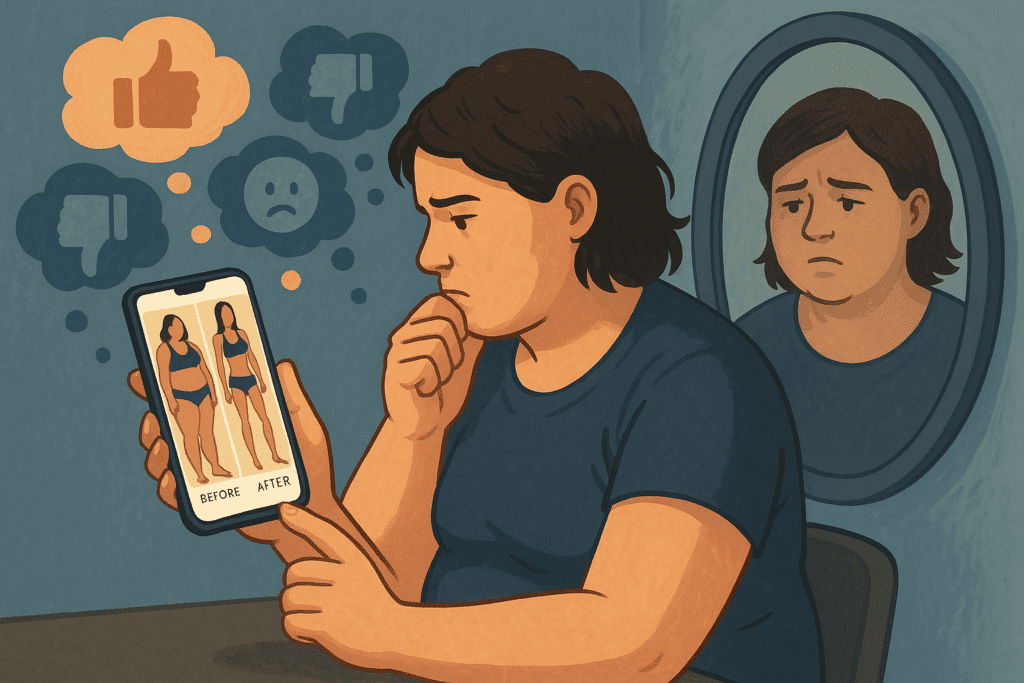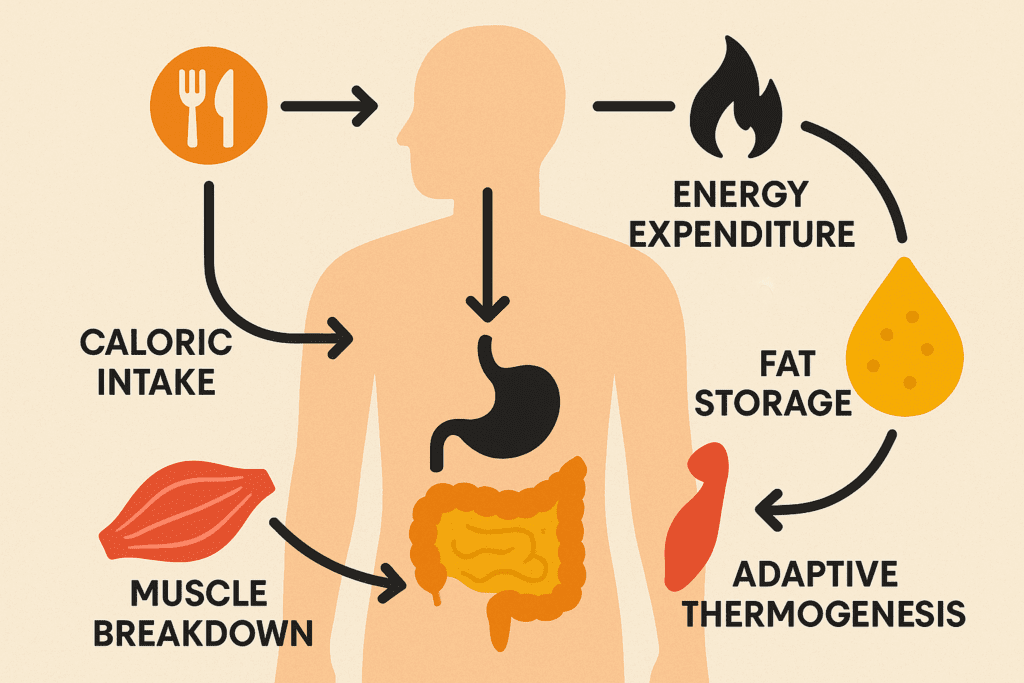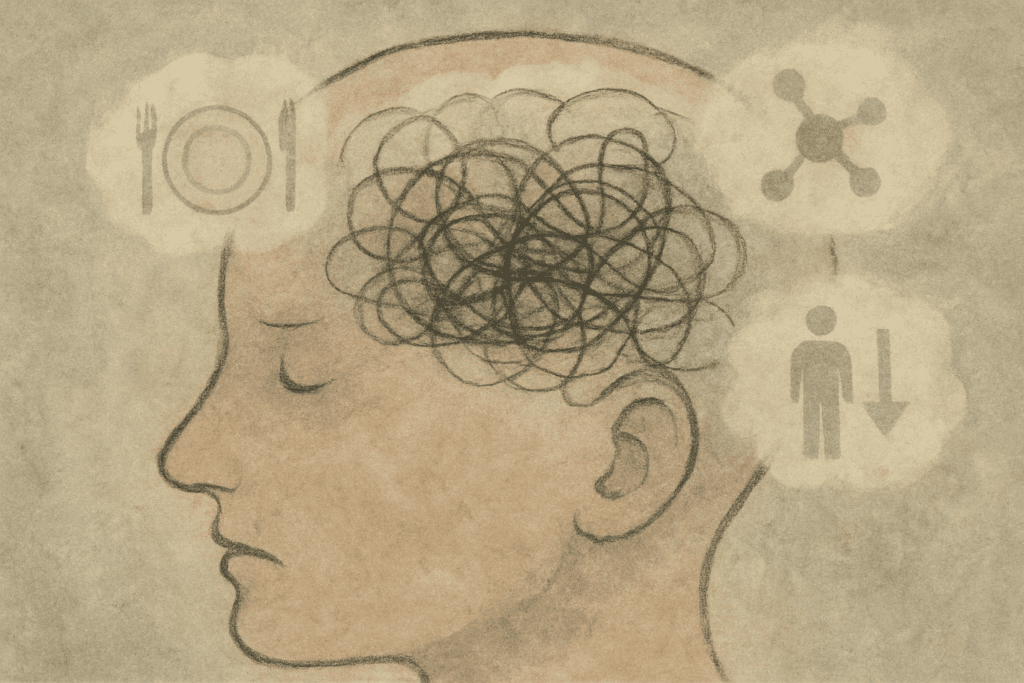The idea of starving to lose weight, while not new, continues to circulate in online communities, especially among those searching for rapid solutions to complex body image and health concerns. Many people, particularly those overwhelmed by diet culture or misinformation, wonder: does starving make you lose weight? At first glance, it may seem like a logical path to a slimmer body. After all, if food equals calories, and calories are restricted or eliminated, weight loss should follow. However, the relationship between food intake, metabolism, and health is profoundly more nuanced. Understanding what happens if you starve yourself requires far more than anecdotal assumptions or crash-diet folklore—it demands a medically accurate, evidence-based exploration.
You may also like: How to Stop Emotional Eating and Regain Control: Mindful Nutrition Strategies That Support a Healthier Lifestyle
Starving to lose weight is not just ineffective in the long term; it can be acutely dangerous and profoundly disruptive to both physical and mental health. While initial weight loss may occur, the consequences of sustained caloric deprivation extend well beyond the number on a scale. The metabolic, hormonal, and psychological impacts of a starvation diet are often underestimated, and the damage it causes can sometimes be irreversible. For those asking how to starve yourself or how can you starve yourself, it’s essential to recognize that the question itself is rooted in a misunderstanding of human physiology and self-care. This article will explore the biological realities of starvation, debunk the myths surrounding it, and offer evidence-based alternatives for achieving a healthy weight and lifestyle.

The Biological Response to Starvation
When the body is deprived of adequate calories, it quickly shifts into survival mode. The first few days may involve using up glycogen stores in the liver and muscles, leading to rapid water weight loss. This often deceives individuals into believing the starving diet is working. However, what happens if you starve yourself for a longer period becomes increasingly detrimental. Once glycogen is depleted, the body begins breaking down fat for energy. Yet, this is not a clean process, and it comes at the cost of muscle tissue breakdown, reduced metabolic function, and hormonal imbalances.
In this state, the body enters what is known as “adaptive thermogenesis,” where it conserves energy by slowing down metabolism. Contrary to the belief that starvation continues to produce consistent weight loss, the body actually resists further loss by becoming more efficient at storing calories. This biological response, an evolutionary adaptation to periods of famine, is one reason why the starvation diet rarely yields sustainable results. In the long run, it can lead to metabolic damage that makes weight regain likely and weight loss harder to maintain.
Moreover, prolonged starvation affects the endocrine system. Hormones like leptin and ghrelin, which regulate hunger and satiety, become dysregulated. Thyroid hormones may decrease, leading to fatigue and cold intolerance. In women, menstruation may cease as the body prioritizes survival over reproduction. These systemic effects highlight how starvation doesn’t just target body fat—it affects nearly every physiological system.

Psychological Consequences of Starving to Lose Weight
While the physical repercussions of starvation are severe, the psychological effects are equally concerning. Caloric deprivation significantly impacts brain chemistry, leading to mood swings, anxiety, irritability, and depression. Studies have shown that even short-term food restriction can impair cognitive function and emotional regulation. For those wondering what if you starve yourself, will you feel better or more in control?—the reality is often the opposite. Starvation creates a mental fog, decreases decision-making capacity, and can provoke obsessive thoughts about food and body image.
This psychological toll often leads to a dangerous cycle of restriction and binge eating. As the body cries out for nourishment, individuals may succumb to intense cravings, followed by guilt and further restriction. This disordered eating pattern can spiral into serious conditions such as anorexia nervosa or bulimia, both of which carry significant health risks and high mortality rates. The question of how can you starve yourself reflects not only a physical desire but often a deeper emotional struggle with self-worth, identity, and societal pressure.
In some cases, individuals become emotionally numb due to prolonged energy deficiency. The body, starved of nutrients, reduces neurotransmitter production, such as serotonin and dopamine, leading to an emotional flatlining that may mimic symptoms of clinical depression. Furthermore, social isolation often accompanies extreme dieting, as meals are avoided and shared experiences involving food become sources of stress and shame.

Short-Term and Long-Term Physical Damage
Initially, the effects of starvation may appear benign or even positive to the untrained eye. Clothes may fit looser, and the number on the scale may drop. However, beneath the surface, the body is suffering. In the short term, symptoms like dizziness, fainting, headaches, and irritability are common. The digestive system slows down, resulting in constipation and bloating. The skin may become dry, and nails brittle, signaling the body is no longer receiving essential nutrients for maintenance.
Long-term consequences are more severe. Muscle atrophy sets in, including cardiac muscle, weakening the heart and increasing the risk of arrhythmias and heart failure. Bone density declines, especially in young women, predisposing them to osteoporosis and fractures. Immune function diminishes, making the body more susceptible to infections and slower to heal. For those contemplating how to starve yourself as a path to transformation, these consequences are sobering reminders of the true cost of starvation.
In extreme cases, prolonged starvation can lead to organ failure. The kidneys and liver, both critical for detoxification and metabolic regulation, can be permanently damaged. Electrolyte imbalances, especially involving potassium and sodium, can trigger life-threatening cardiac events. The body’s eventual inability to thermoregulate means that even mild temperatures feel unbearable, contributing to chronic discomfort and health instability.

The Myth of the Starvation Diet and Its Online Popularity
Despite the overwhelming evidence of harm, the starvation diet continues to attract attention, particularly on social media platforms where extreme transformations are idolized. Often, individuals share before-and-after images without disclosing the physical and emotional cost behind them. These portrayals promote unrealistic standards and dangerous methods, creating a false narrative that starving to lose weight is not only effective but admirable.
The problem with these representations is that they overlook the rebound effect. Many individuals who engage in extreme restriction experience rapid weight regain, sometimes exceeding their starting weight. This phenomenon, known as weight cycling or yo-yo dieting, has been linked to increased risk of cardiovascular disease, insulin resistance, and psychological distress. In this context, the question does starving make you lose weight is more complicated than it appears. While weight may initially drop, the long-term outcome is often worse than if no intervention had been attempted at all.
Additionally, many people who ask how can you starve yourself are unknowingly influenced by misinformation propagated by unqualified influencers. These individuals often lack any background in nutrition or medicine, yet present themselves as health authorities. The result is a proliferation of pseudoscience that can mislead vulnerable individuals into adopting behaviors that may endanger their lives.

Understanding Metabolism and Why Starving Backfires
A key reason why starvation does not yield sustainable results lies in the body’s metabolic adaptation. Metabolism refers to the sum of all chemical processes that maintain life, including how the body uses energy. When caloric intake drops too low, the body interprets this as a threat and downshifts its metabolic rate. This means you burn fewer calories at rest and during activity, making further weight loss more difficult.
This response can persist even after normal eating resumes. Research indicates that after a period of starvation, individuals may require fewer calories than before just to maintain their weight. This adaptation, meant to preserve life during famine, works against those who pursue a starving diet. Furthermore, because muscle mass is often lost during starvation, and muscle is metabolically active tissue, the body’s ability to burn calories further declines.
Another overlooked factor is the body’s prioritization of fat storage post-starvation. When food becomes available again, the body rapidly stores it as fat to prepare for future deprivation. This evolutionary response was beneficial for survival in ancestral environments but is counterproductive in modern contexts. It answers the question does starving make you lose weight with a resounding caveat: only temporarily, and often at the expense of future health and metabolic flexibility.
Frequently Asked Questions (FAQ)
1. Is it possible to lose fat without triggering the body’s starvation response? Yes, it is entirely possible to reduce body fat without activating the harmful effects associated with a starvation diet. Fat loss can be achieved through a moderate caloric deficit, typically by consuming fewer calories than you expend, but not to the extreme levels that mimic starvation. Unlike the approach some people take when researching how to starve yourself, a medically guided nutrition plan focuses on sustainable habits. The key lies in balancing energy intake with macronutrient needs while supporting hormonal and metabolic health. Rather than wondering what happens if you starve yourself, consider how gradual and informed changes can enhance fat loss while preserving muscle and well-being.
2. Why do some people regain weight quickly after a starvation diet? Rapid weight regain after extreme dieting often occurs due to several metabolic and behavioral factors. When the body endures a period of deprivation, it adapts by lowering metabolic rate and increasing fat storage efficiency once normal eating resumes. Many who try starving to lose weight are unaware that this adaptation can persist, making post-diet weight management more challenging. Additionally, the psychological rebound from prolonged restriction can lead to binge eating and emotional overcompensation with food. This underscores why asking how can you starve yourself is not just risky—it is a misunderstanding of how the body protects itself during and after deprivation.
3. Are there long-term brain effects linked to chronic food restriction? Emerging research suggests that repeated engagement in a starving diet may alter brain structure and cognitive performance over time. Areas of the brain associated with memory, decision-making, and emotional regulation can be affected by nutrient deficiencies and hormonal imbalances triggered by starvation. Individuals who explore how to starve yourself often overlook the role of essential fatty acids, amino acids, and micronutrients in neural communication and plasticity. Persistent undernutrition can impair neurotransmitter function, contributing to long-term mood disorders and cognitive decline. Instead of asking what if you starve yourself will you succeed, it’s important to ask what long-term mental capacity you might sacrifice in the process.
4. Can intermittent fasting be confused with starvation? While both intermittent fasting and starvation involve periods of reduced food intake, they differ significantly in purpose, structure, and biological effect. A well-regulated intermittent fasting plan includes deliberate eating windows with sufficient caloric and nutrient intake, whereas a starving diet lacks structure and often leads to malnutrition. Individuals who ask how can you starve yourself may conflate these approaches, but true intermittent fasting respects the body’s nutritional needs. Starvation disrupts hormonal balance, while intermittent fasting—when done responsibly—can support it. The outcomes are vastly different depending on whether the method fosters nourishment or depletion.
5. What are some early warning signs that your body is reacting negatively to starvation? If you’re beginning to feel constantly cold, unusually fatigued, or losing your ability to concentrate, these may be early red flags that the body is reacting to caloric deprivation. Other subtle indicators include hair thinning, persistent dizziness, irregular menstruation, and increased irritability. People exploring starving to lose weight may initially ignore these signs, mistaking them for evidence that their plan is “working.” However, these symptoms reflect internal stress that could escalate into severe complications. Asking what happens if you starve yourself isn’t just about weight loss outcomes—it’s about recognizing when the body starts sounding alarm bells.
6. Can a starvation diet affect your ability to build muscle in the future? Absolutely. When the body is deprived of energy and protein, it not only burns fat but also breaks down muscle tissue for fuel. Even after resuming normal eating, it can take time to regain lost muscle, especially if the metabolism has adapted to lower energy needs. Athletes and fitness enthusiasts often learn this the hard way after experimenting with a starving diet in pursuit of rapid weight loss. Instead of searching how to starve yourself to get lean, a more sustainable approach involves strength training, sufficient protein intake, and consistent nourishment. The long-term cost of muscle loss far outweighs the short-term gain of shedding pounds.
7. How does social pressure influence the decision to pursue a starvation diet? The influence of social media, fashion culture, and peer validation plays a profound role in why individuals consider starving to lose weight. Platforms filled with curated images and weight-loss transformations often mask the mental and physical cost behind those results. This creates an unrealistic ideal and leads many to internalize the belief that extreme thinness equals success or desirability. People asking what if you starve yourself will you finally feel confident are often driven by these external narratives. Addressing this pressure requires education, self-awareness, and a cultural shift toward body diversity and health-centered goals rather than aesthetics.
8. Is there a safe way to reset eating habits without extreme restriction? Yes, and it’s grounded in the principle of dietary rehabilitation rather than starvation. A reset can begin with structured meal timing, inclusion of balanced macronutrients, and re-establishing hunger cues through mindful eating practices. Individuals curious about how to starve yourself may actually be seeking control over chaotic eating habits but misinterpret restriction as the only solution. Working with a registered dietitian or nutritionist can help design a personalized plan that feels both manageable and nourishing. Sustainable change arises not from deprivation but from consistency, balance, and self-trust.
9. How does starvation impact reproductive health beyond menstruation changes? While amenorrhea is a well-known effect of starvation in women, other aspects of reproductive health are also compromised. Chronic energy deficiency can reduce libido, impair ovulation, and decrease fertility over time. Men, too, experience hormonal changes such as lowered testosterone, which affects sexual function and mood. Individuals who are wondering does starving make you lose weight may not realize that this question should also encompass what you lose hormonally and reproductively. Nutrition plays an essential role in maintaining hormonal equilibrium, which is fundamental to reproductive wellness in all genders.
10. What strategies can help someone recover from a starvation-based mindset around food? Recovering from a mindset that equates restriction with virtue takes both time and intention. One approach is cognitive restructuring, which involves identifying and challenging thoughts like “eating less means I am more disciplined.” People drawn to how can you starve yourself often operate from a place of guilt, fear, or low self-worth. Therapy, especially in the context of eating disorder recovery, can help reframe food as nourishment rather than an adversary. Community support, journaling, and exposure to intuitive eating philosophies can also support healing. Asking what happens if you starve yourself should ultimately lead to a deeper question: how can I build a relationship with food that supports my whole self?

A Final Word on Starvation and Sustainable Wellness
What happens if you starve yourself is far more than a curiosity—it is a question that touches the very core of human biology, psychology, and social identity. While starvation may result in short-term weight loss, it does so at an extraordinary cost to physical and mental health. The question of does starving make you lose weight must be reframed with context and care, recognizing the temporary nature of the weight loss and the long-term risks it entails. For those tempted to ask how can you starve yourself or seek out a starving diet as a shortcut, it’s essential to remember that health cannot thrive in the absence of nourishment.
Sustainable weight management is possible—but it requires a shift away from deprivation and toward evidence-based, compassionate care. When we replace restriction with nourishment, and shame with self-respect, we create a foundation for lasting wellness. Rather than chasing quick fixes, embracing a balanced lifestyle rooted in mindful eating and holistic support offers the real path forward. In this light, the question evolves from what if you starve yourself, will you succeed? to how can you care for yourself in ways that truly support your well-being—today and for the future.
Was this article helpful? Don’t let it stop with you. Share it right now with someone who needs to see it—whether it’s a friend, a colleague, or your whole network. And if staying ahead on this topic matters to you, subscribe to this publication for the most up-to-date information. You’ll get the latest insights delivered straight to you—no searching, no missing out.
Further Reading:
How Long Can You Live Without Food?

